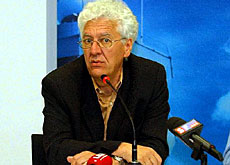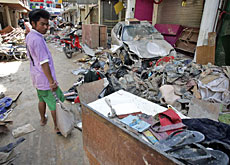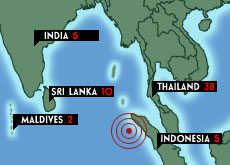Care specialist recounts grim scenes

A Swiss psychologist has just returned from helping survivors in the Thai resort, Phuket, which was devastated by last week’s tsunami disaster.
Peter Fässler, head of the Winterthur Centre for Crisis Intervention, spoke to swissinfo about the six days he spent in the crisis-stricken area.
swissinfo: What did you find when you arrived in Phuket?
Peter Fässler: It was an indescribable mass of destruction… an almost apocalyptic catastrophe.
Bungalows, hotel complexes and entire resorts had been destroyed. Cars piled on top of each other lay somewhere on a cliff.
A navy vessel, 20 metres long and ten metres wide, was lying one and a half kilometres inland. These are pictures that you just cannot imagine.
swissinfo: What was your mission there and what kind of help could you offer in the first phase?
P.F.: After the tidal wave occurred, the Elvia travel insurance company sent me immediately to Phuket to find out what would be needed on the ground.
I was under orders to set up both medical and psychological care, or at least start appropriate action. It was really [marvellous] when we found a few missing people.
swissinfo: How did your work in Phuket compare with your previous operations in crisis areas?
P.F.: Until now, no catastrophe was ever comparable with another. What happened in Asia was a state of affairs, which I could never have imagined.
As someone who is experienced in crisis situations, you put together scenarios to be able to educate other therapists. The previous events were laughable when compared with what we found in Phuket.
swissinfo: What long-term consequences can such a catastrophe have for the survivors?
P.F.: Catastrophes always have long-term effects. We know that some of those affected will manage to cope relatively well.
Other people will have problems and will not be able to come to terms with the dramatic and panic-stricken situation they have experienced.
There is also a large group of people who have lost someone or who are missing someone. They all have different needs that we have to try to deal with. We try to be fair to all of them.
swissinfo: How can relatives of the missing deal with their grief when they cannot be sure if their loved ones are really dead?
P.F.: When someone has the body, ashes or DNA analysis of the missing relative, there can be no doubt.
Relatives of missing people – depending on their nature – often have doubts for years or decades about whether the member of the family is really dead. And that is a real hindrance in dealing with grief.
swissinfo: Do the relatives of missing people receive long-term support in coming to terms with their grief?
P.F.: [Yes] but the principle is if people need support, they have to ask for it themselves.
They can do that, for example, by looking for addresses that can be found in travel bureaux or by seeking someone near where they live. It is important that they find someone who really knows what they are talking about.
swissinfo: How do you yourself deal with the psychological strain?
P.F.: We regularly exchange views among colleagues. What is important for those affected is exactly the same for us – talking, talking and talking.
We too have to find a way to deal with what we have gone through. It is important not to let it eat you away inside because that would be the beginning of a huge, stressful burden.
swissinfo: Were there tourists who stayed behind to offer help?
P.F.: I met many Swiss who offered help and we made use of some of these offers. These people didn’t extend their stay but gave assistance when it was needed. Their support was really welcome.
There were other tourists who simply completed their holidays, sometimes in a hotel right next to a destroyed resort.
This will happen in other catastrophes but I think you have to differentiate between the two groups.
swissinfo-interview: Nicole Aeby
Peter Fässler is head of the Winterthur Centre for Crisis Intervention.
In previous missions, Fässler offered counselling to people affected by the terrorist attack on Luxor, the Swissair crash off Canada and the funicular accident at Kaprun, Austria.
Psychologist Peter Fässler set up a refuge for survivors of the tidal waves in Phuket, Thailand, together with the Swiss Agency for Development and Cooperation.
The Elvia travel insurance company sent Fässler there.

In compliance with the JTI standards
More: SWI swissinfo.ch certified by the Journalism Trust Initiative


You can find an overview of ongoing debates with our journalists here. Please join us!
If you want to start a conversation about a topic raised in this article or want to report factual errors, email us at english@swissinfo.ch.